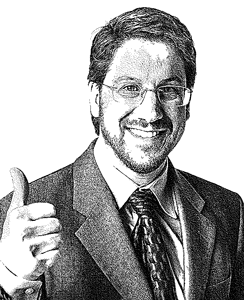
Barry Bunin, PhD
Founder & CEO
Collaborative Drug Discovery
Nobel Prize in Chemistry Awarded for Protein Work. It was no surprise when this year’s Nobel Prize in Chemistry was awarded to David Baker of the University of Washington for his work in creating new proteins; and to Demis Hassabis and John M. Jumper, both of Google DeepMind in London for their work in creating AlphaFold2. Greg Verdine had a humorous LinkedIn post I really liked: “Some years the Nobel Prizes are head-scratchers. This year they are head-bangers! 🤩🤩🤩”. The Nobel Prize Committee, in its formal announcement, said: “David Baker has succeeded with the almost impossible feat of building entirely new kinds of proteins. Demis Hassabis and John Jumper have developed an AI model to solve a 50-year-old problem: predicting proteins’ complex structures. These discoveries hold enormous potential.” Derek Lowe, writing in his blog for Science, notes: “This is one of those awards that is not really a surprise—as the abilities of these methods have become clear, the phrase ‘protein folding problem’ has begun to disappear from the language as a reference to some huge, intractable feat.” This is in contrast to a Scientific American article published last year headlined “Nobel Prizes Are Taking Longer to Award Groundbreaking Research.” The article says, “Across the three science prizes, chemistry now has the longest ‘Nobel lag’—an average of 30 years over the past decade—and physiology or medicine has the shortest, at 26 years.” It seems we are in a period of accelerated innovation and appreciation of innovation too.
* * *
“Research That Led to Obesity Drugs Wins Major Medical Prize." That’s the headline from a recent New York Times article on the Lasker Awards which were given to scientists whose research helped lead to the discovery of a new class of obesity drugs, self-protection from infectious diseases and cancer. The Laskers are highly regarded in the fields of biomedicine and are sometimes seen as foretelling recipients of the Nobel Prizes in the sciences. Honored for their work on GLP-1, the hormone that led to drugs like Wegovy and Ozempic, are Dr. Joel Habener, Svetlana Mojsov and Lotte Bjerre Knudsen. The honoring of Dr. Mojsov is considered long overdue recognition, as detailed last year in an article in Science.
* * *
"Medallion Containing Original Mold from Discovery of Penicillin Goes up for Auction.” CNN carries a headline- on its coverage of a medallion containing some of the original mold involved in the discovery of penicillin, which is expected to fetch up to $50,000 when it goes up for auction later this month. A statement from auction house Bonhams notes the medallion was created and inscribed by Scottish bacteriologist Alexander Fleming in the course of one of the most pivotal discoveries in medical history. It quotes Fleming as writing: “When I woke up just after dawn on September 28, 1928, I certainly didn't plan to revolutionize all medicine by discovering the world's first antibiotic, or bacteria killer. But I suppose that was exactly what I did." Fleming famously had left a stack of staph cultures in his study next to an open window where they were contaminated by an airborne mold during his holiday. Before disposing of the cultures, he noticed that the mold had prevented normal growth by the staph. His scientific curiosity led to the monumental discovery. The medallion contains a specimen of the original penicillin mold on blotting paper, mounted within a glass disc held in place by a black plastic rim about two inches in diameter. It was a gift for his niece and inscribed with the message: “The mold that made penicillin / Alexander Fleming.” Bonhams notes that Fleming created a limited number of the medallions for important people, including the Pope Pius XII, the Queen Mother, British Prime Minister Winston Churchill and U.S. President Franklin Roosevelt.
* * *
"Co-opting Bacterial Proteins for Macrophage-based Drug Delivery.” Drug Discovery News carries that headline for its article on how proteins from intracellular pathogens can help expel drugs delivered by macrophages. A team of researchers led by Carine Smith, a physiologist from Stellenbosch University, is taking advantage of the ability of L. monocytogenes proteins to invade cells, including macrophages, multiply in them, and then leave. The researchers believe that macrophage-drug carriers can release drugs at the appropriate site and deliver more potent drugs with fewer off-target effects. Dr. Smith said, “It provides a means by which we can address drug-resistant and chronic conditions with little risk to the patient.” With other cell-based drug delivery systems, drug delivery relies on passive diffusion to release the drugs, with drugs often becoming trapped within vacuoles in the cell, so the cell must die to release the drug. Smith’s team turned to intracellular bacteria to solve this problem. Howard Gendelman, an immunopharmacologist and microbiologist at the University of Nebraska Medical Center who was not involved in the study, said: “We know that macrophages are attracted to disease sites, but if they're carrying a therapeutic agent, you can imagine that therapeutic agents could be a lot more effective if the macrophage is acting as a deliverable for these agents.”
* * *
Barry A. Bunin, PhD, is the Founder & CEO of Collaborative Drug Discovery, which provides a modern approach to drug discovery research informatics trusted globally by thousands of leading researchers. The CDD Vault is a hosted biological and chemical database that securely manages your private and external data.


